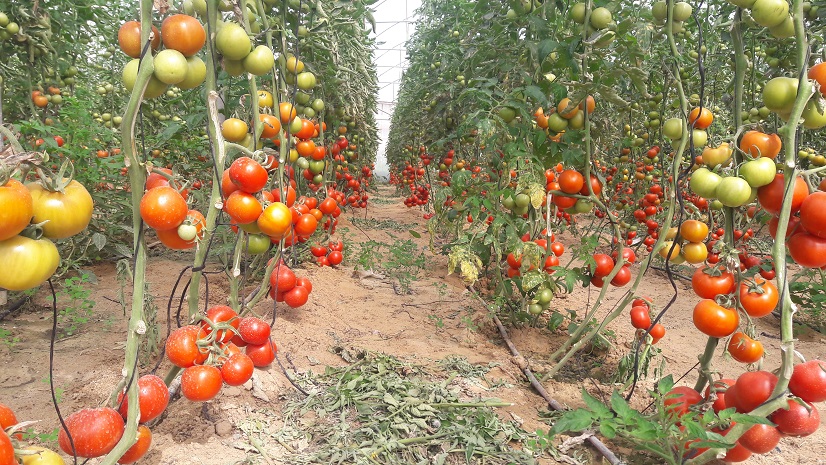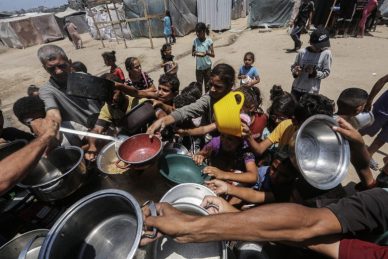Amidst a state of shock farmer Bandar Abu-Draz 37 looks at his crop which he cannot sell due to having large supplies compared to the limited demand and the low prices in the local market causing heavy financial losses.
At his farm in the Khuza’a area east of Khan Younis Abu Draz looks with sorrow on ‘the cherry tomato’ crop which he could not sell because of its low price standing at a half shekel per kilo.
The agricultural sector is at the risk of collapse due to the difficult economic conditions in the Gaza Strip and the huge daily financial losses of farmers.
A critical stage
As a result of the intensification of the Israeli siege on the Gaza Strip and the continued ban on exports from the Gaza Strip to the 1948 occupied territories (Israel) the agricultural sector is going through a very critical phase that could lead to its complete collapse in all sectors.
The decline of prices in local markets has become a source of frustration for farmers because of the economic collapse of the Gaza Strip as a result of the suffocating siege and the imposition of sanctions by the Palestinian Authority.
Abu-Draz points out that the agricultural sector in the Gaza Strip is on the verge of collapse and it started collapsing already.
Abu Draz suffered a lot of losses because of the lack of purchase pointing out that there is no supporting body for this category which has been chased by courts because of their inability to pay traders.
Leaving work
During the interview with Abu Draz our correspondent was surprised that he gave tomato as food for animals instead of delivering it to the European markets as it was supposed to be exported to those markets.
Abu Draz who supports seven people and pays his brother’s fees abroad says he is considering abandoning agricultural work because of the heavy losses he suffered as a result of the export ban and the low prices in the local markets.
The price of one kilo of tomato in the local markets is one shekel which means that it is sold at half a shekel at the farm which is a disaster at various levels according to Abu Draz.
He explained that the Israeli ban on the entry of supplies used in agriculture the high prices of pesticides and chemical fertilizer and banning the exports of agricultural products were the main causes behind the deterioration of the situation of farmers.
As for the livestock sector the situation is not very different especially in light of the farmers’ inability to pay their debts because of the low prices of chicken and the low demand resulting from the difficult economic situation.
Farmer Tariq Abu Khater one of the merchants who suffered heavy losses is being chased by the police and security services due to unpaid bills owed to him due to financial losses.
Looking for solutions?
Abu Khater explained to the PIC correspondent that poultry farming is his only source of livelihood in light of the difficult economic conditions in the Gaza Strip pointing out that he might lose his source of livelihood putting his family of six at risk.
He said: “The chicken costs us about nine shekels and its market price is nine shekels which means selling it at 7.5 shekels in the poultry farm which causes a loss to us of one and a half shekel per kilo.”
Abu Khater appealed to the Ministry of Agriculture and concerned parties to work to find a solution to their problem calling for preventing the import of Israeli frozen chickens to allow local farmers supply their chickens to the market at reasonable prices.
Economic expert Mohammed Abu Jayyab pointed out that the agricultural sector is an important part of the Palestinian economy and an inseparable part of the difficult reality that Gaza suffers from due to the ongoing Israeli violations.
In an interview with the PIC Abu Jayyab pointed to the seriousness of the Palestinian Authority’s lack of support to the agricultural sector which is limited to NGOs and unions that exert every effort possible to help the farmers.
He called for the need to amend the approach adopted at the legal procedural and implementation levels by the Palestinian Authority and the competent authorities to preserve the remaining agricultural land.
Officials and economic experts warned of the danger of Israeli violations against the agricultural sector in the Gaza Strip and their negative impact on the lives of citizens and consumers as well as the agricultural land itself.
The Director of Operations and Development at the Union of Agricultural Work Committees Bashir Al-Anqa said during a seminar days ago that the weak purchasing power of the local consumer as a result of poor economic conditions led to a sharp decline in prices which affected the income of farmers and inflicted heavy losses on this important sector.















